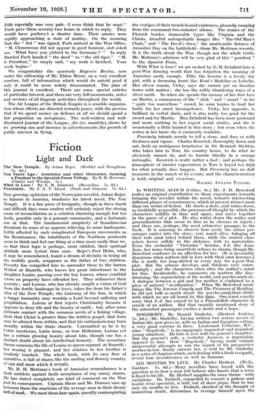• In WRITING ALOUD (Collins. Os.) Mr. J. D. Beresford
makes an original contribution to those experiments towards bringing the novelist Within the novel, towards intersecting different planes of consciousness, which at present attract more than one writer of fiction. He starts a story, and writes denim, as truthfully as possible, the processes of thought by which the characters solidify in time and space, and move together in the paces of a plot. He also writes down the asides and generalizations that occur to him as he chooses or rejects ; and these are, perhaps, the most attractive passages in the book. It is amusing to observe how easily the minor per- sonages canter into the story, very much alive, bringing. all their tails (and tales) behind them, while the central char- acters hover mildly in the distance, loth to materialize. Even the archaistic " Victorian " heroine, J-J. (for Jean- Jane, her name being unsettled) refuses to charm, though Mr. Beresford confesses to an affection for her. (It is invariably disastrous when authors fall in love with their own heroines.) She is really too long-skirted in every way for a post-War plot. But the scheme develops and thickens very enter- tainingly; and the characters often alter the author's mind for him. Incidentally, he comments on matters like day- dreaming, the regeneration of the world, and psycho-analysis. A dialogue between a girl and her mother is explained as a piece of natural "re-education." When Mr. Beresford wrote things like The Jervaise Comedy and The Prisoners of Hurtling, he did not talk so much about the psycho-analytical cliches with which we are all bored by this time. One is not exactly sorry that J.-J. has ceased to be a Pirandellish character in search of an author. But that casually mentioned story of the entombed passengers excites a desire and a hope.












































 Previous page
Previous page